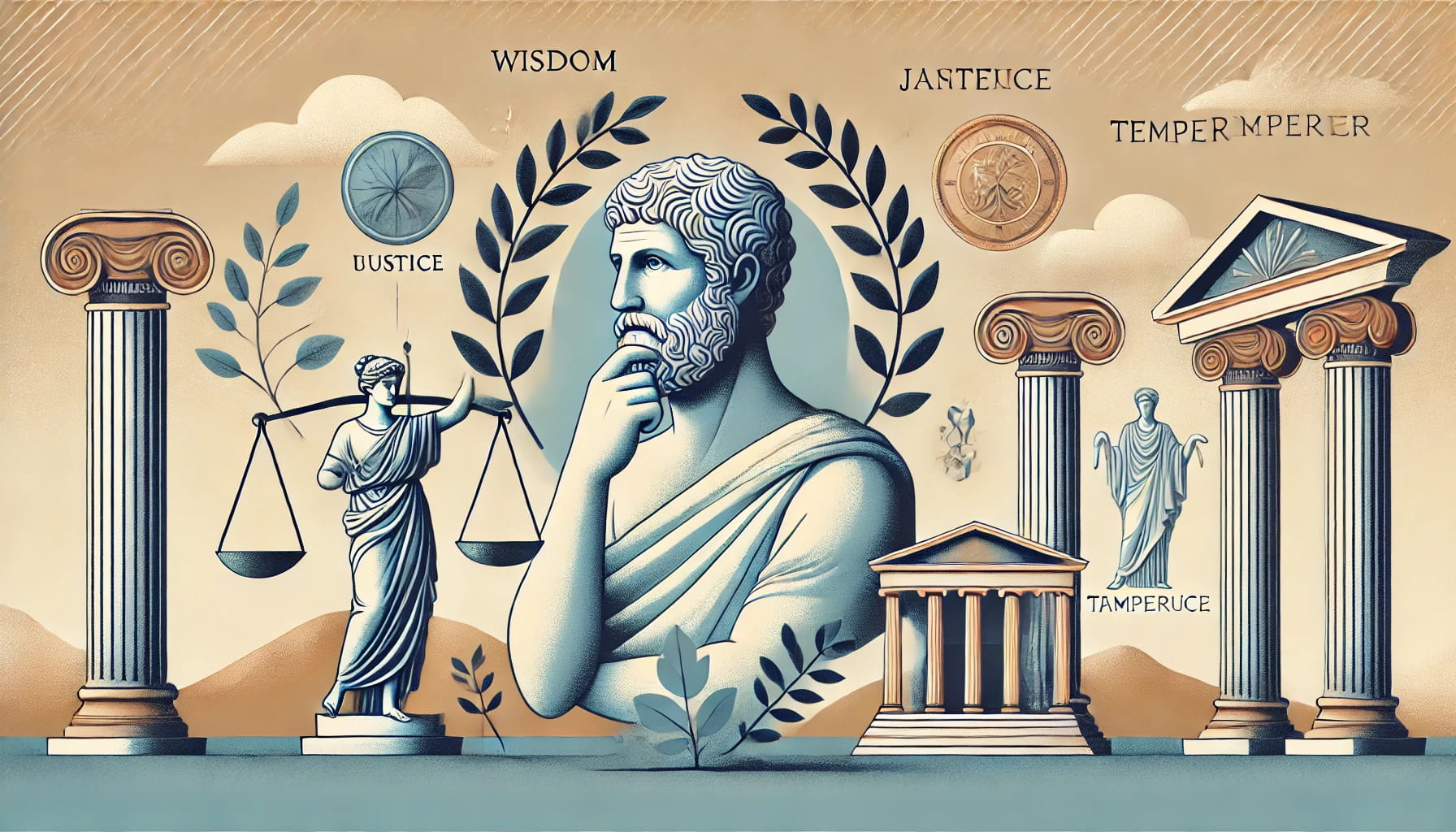Leadership is not merely about achieving goals or driving results; it is fundamentally about building trust and guiding others through integrity and virtue. Stoicism, a philosophy rooted in ancient Greece and Rome, offers timeless principles that align closely with the ideals of ethical leadership. By embracing the Stoic virtues of wisdom, courage, justice, and temperance, leaders can cultivate trust, make ethical decisions, and inspire others to act with purpose and integrity.
This essay explores how Stoicism provides a robust framework for ethical leadership and offers practical applications for modern leaders seeking to embody these principles.
The Stoic Virtues and Leadership
The four cardinal virtues of Stoicism—wisdom, courage, justice, and temperance—serve as a foundation for ethical leadership. Each virtue has distinct applications in leadership contexts:
- Wisdom
Wisdom is the ability to discern right from wrong and make sound decisions. For leaders, this means understanding the broader context of their actions and considering the long-term consequences. Marcus Aurelius, the Roman Emperor and a Stoic philosopher, frequently emphasized reflective thinking in his Meditations. Wisdom enables leaders to navigate complex situations with clarity and foresight, avoiding impulsive or short-sighted decisions. - Courage
Courage in Stoicism is not limited to physical bravery; it also includes moral courage—the willingness to stand by one’s principles even in the face of adversity. Ethical leaders demonstrate courage by addressing injustices, making unpopular but necessary decisions, and accepting responsibility for their actions. - Justice
Justice is central to ethical leadership. It involves treating others fairly, upholding principles of equality, and prioritizing the common good over personal gain. Seneca, a Stoic philosopher, advised leaders to act in service of others, emphasizing that true power lies in benefiting those one leads. - Temperance
Temperance, or moderation, is the ability to control impulses and desires. Leaders who practice temperance avoid overindulgence in power, recognition, or material success. Instead, they focus on balanced and reasoned decision-making, fostering a sense of stability and trust among their teams.
Building Trust Through Stoicism
Trust is the cornerstone of effective leadership, and Stoicism offers practical strategies for building and maintaining trust:
- Leading by Example
Ethical leaders embody the virtues they wish to inspire in others. By consistently acting with integrity, they set a standard for their teams to follow. Marcus Aurelius reminded himself to act with dignity and sincerity, knowing that his actions influenced those around him. Modern leaders can adopt a similar approach, ensuring their behavior aligns with their values. - Practicing Transparency
Trust grows when leaders are honest and open about their intentions and decisions. Stoic leaders embrace transparency, recognizing that clear communication fosters mutual understanding. They avoid deceit and prioritize authenticity, even when the truth is difficult. - Prioritizing Empathy and Justice
Treating others with respect and fairness is integral to Stoic leadership. By understanding the needs and perspectives of their team members, leaders can make equitable decisions that strengthen relationships and build a supportive environment.
Stoic Practices for Ethical Leadership
Leaders can integrate Stoic principles into their daily routines through specific practices:
- Daily Reflection: Like Marcus Aurelius, leaders can dedicate time to reflect on their actions and decisions, assessing whether they align with their values.
- Negative Visualization: Anticipating potential challenges helps leaders prepare mentally and respond with composure.
- Focus on Control: Stoicism emphasizes focusing on what is within one’s control and letting go of external outcomes. Leaders can use this principle to remain calm under pressure.
- Journaling: Writing about leadership experiences and ethical dilemmas fosters self-awareness and encourages thoughtful decision-making.
The Long-Term Impact of Stoic Leadership
Ethical leadership grounded in Stoic principles creates a ripple effect, influencing not only the immediate team but also the broader organization and community. Leaders who prioritize virtue over personal ambition build a culture of trust, accountability, and mutual respect.
Furthermore, Stoic leadership equips individuals to handle adversity with grace and resilience. In times of crisis, leaders who embody Stoic virtues inspire confidence and stability, guiding their teams through uncertainty with wisdom and courage.
Conclusion: A Philosophy for Ethical Leadership
Stoicism provides a timeless framework for ethical leadership, emphasizing the virtues needed to build trust and guide others with integrity. By practicing wisdom, courage, justice, and temperance, leaders can navigate the complexities of modern organizations while staying true to their principles.
As Marcus Aurelius wrote, “Waste no more time arguing about what a good man should be. Be one.” Leaders who adopt Stoic principles not only build trust but also inspire others to pursue virtue, creating a legacy of ethical and impactful leadership.

